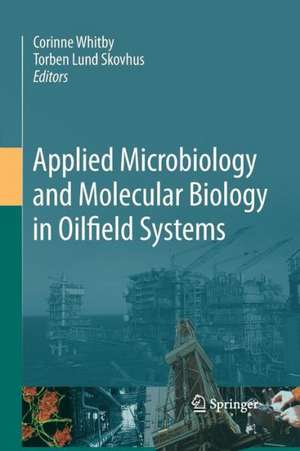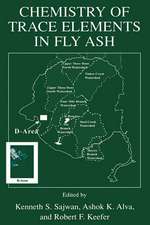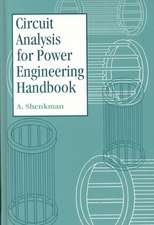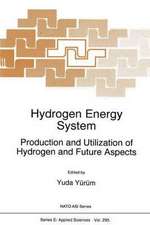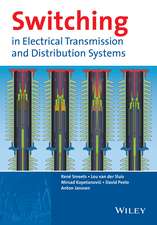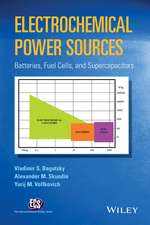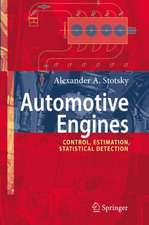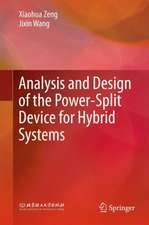Applied Microbiology and Molecular Biology in Oilfield Systems: Proceedings from the International Symposium on Applied Microbiology and Molecular Biology in Oil Systems (ISMOS-2), 2009
Editat de Corinne Whitby, Torben Lund Skovhusen Limba Engleză Paperback – 23 noi 2014
| Toate formatele și edițiile | Preț | Express |
|---|---|---|
| Paperback (1) | 944.51 lei 6-8 săpt. | |
| SPRINGER NETHERLANDS – 23 noi 2014 | 944.51 lei 6-8 săpt. | |
| Hardback (1) | 950.52 lei 6-8 săpt. | |
| SPRINGER NETHERLANDS – 27 oct 2010 | 950.52 lei 6-8 săpt. |
Preț: 944.51 lei
Preț vechi: 1151.84 lei
-18% Nou
Puncte Express: 1417
Preț estimativ în valută:
180.73€ • 189.20$ • 149.54£
180.73€ • 189.20$ • 149.54£
Carte tipărită la comandă
Livrare economică 05-19 aprilie
Preluare comenzi: 021 569.72.76
Specificații
ISBN-13: 9789400789807
ISBN-10: 9400789807
Pagini: 296
Ilustrații: XVI, 279 p.
Dimensiuni: 155 x 235 x 16 mm
Greutate: 0.42 kg
Ediția:2011
Editura: SPRINGER NETHERLANDS
Colecția Springer
Locul publicării:Dordrecht, Netherlands
ISBN-10: 9400789807
Pagini: 296
Ilustrații: XVI, 279 p.
Dimensiuni: 155 x 235 x 16 mm
Greutate: 0.42 kg
Ediția:2011
Editura: SPRINGER NETHERLANDS
Colecția Springer
Locul publicării:Dordrecht, Netherlands
Public țintă
Professional/practitionerCuprins
PART I: Introduction, Sampling and Procedures. PART II: Application of Molecular Microbial Methods to the Oil Industry. PART III: Problems Caused by Microbes to the Oil Industry and Treatment Strategies. PART IV: How Specific Microbial Communities Benefit the Oil Industry. PART V: Fuel for the Future. APPENDIX I.
Notă biografică
Dr Corinne Whitby is a lecturer in Environmental Microbiology at the University of Essex, UK. She has over 10 years primary research experience in molecular microbial ecology. Her research is focused upon the application of Molecular Microbiological Methods (MMM) to analyze the biodegradation of hydrocarbons (e.g. naphthenic acids and polyaromatic hydrocarbons) and how nanoparticles affect hydrocarbon biodegradation. Her research is also involved in analyzing the biogeochemical cycling of nutrients in marine, freshwater and terrestrial systems. She was the original founders of ISMOS1 (with Dr Skovhus) and co-organised ISMOS2, Denmark, 2009 and the forthcoming ISMOS3, Calgary, 2011. Dr. Torben Lund Skovhus graduated from the University of Aarhus, Denmark, in 2002 with a Master's degree in Biology. In 2005 he finished his PhD from Department of Microbiology, University of Aarhus. In 2005 Torben was employed at Danish Technological Institute (DTI) in the Centre for Chemistry and Water Technology, where he got responsibility for the consultancy activities for the oil and gas industry, molecular detection of troublesome microbes in process and domestic waters and development and introduction of new molecular monitoring tools for the industries. Torben was Head of the DTI Microbiology Laboratories from 2006 to 2008 while he was building up several consultancy activities with the oil and gas industry. He is now in a position as Team Leader in DTI Oil & Gas Center. The team counts dedicated chemists, microbiologists, engineers, consultants. All with a long history in general troubleshooting of technical industrial systems for microbiologically caused problems and with a particular focus on oil, gas and petroleum systems.
Textul de pe ultima copertă
Applied Microbiology and Molecular Biology in Oil Field Systems addresses the major problems microbes cause in oil fields, (e.g. biocorrosion and souring) and how beneficial microbial activities may be exploited (e.g. MEOR and biofuels). The book describes theoretical and practical approaches to specific Molecular Microbiological Methods (MMM), and is written by leading authorities in the field from both academia and industry. The book describes how MMM can be applied to faciliate better management of oil reservoirs and downstream processes. The book is innovative in that it utilises real industrial case studies which gives useful technical and scientific information to researchers, engineers and microbiologists working with oil, gas and petroleum systems.
Caracteristici
Covering technical and scientific aspects of specific molecular microbiological methods (MMM) Emphasises how MMM can be applied to address the major problems caused by microbes in oil reservoirs, as well as exploit the beneficial activities of microbes Detailed description of the methods/ protocols used in real industry cases
